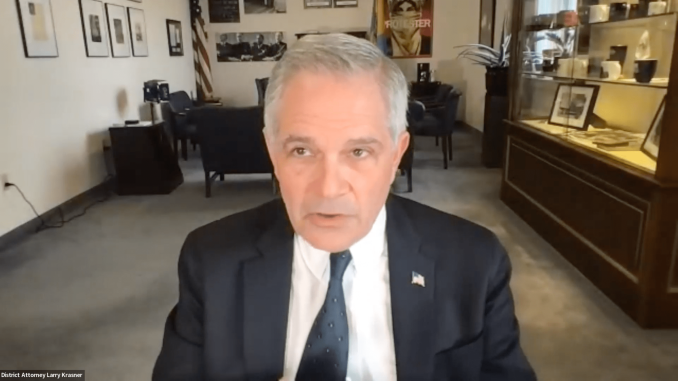
Philadelphia District Attorney Larry Krasner discussed reforming the city’s criminal justice system during a Zoom panel Thursday afternoon hosted by Temple University Libraries and the Faculty Senate Committee on the Status of Faculty of Color.
The event kicked off Temple Libraries’ “Chat in the Stacks” series for the Spring 2022 semester which includes panels moderated by Temple faculty discussing timely topics with guest speakers, according to the Temple Libraries website.
Tara Tripp, a criminal justice professor and member of the Status of Faculty of Color committee, moderated the discussion, which had roughly 65 to 70 attendees. Krasner answered questions from Tripp and the audience, sharing his opinions on topics like the city’s gun violence crisis, victim services, cash bail and crime prevention.
Tripp suggested Krasner as a guest for “Chat in the Stacks” in October 2021 after he spoke to her Intro to Criminal Justice class.
When asked about how he’s addressing violence in the city, especially gun violence among the youth population, Krasner said his office is talking with criminologists to cultivate possible solutions. Krasner is also advocating for the Philadelphia Police Department to increase its use of forensic science to evaluate evidence in cases, like making a larger lab and updating machinery.
“Forensic science is part of the reason so many innocent people ended up in jail, and it’s part of the reason that there are literally thousands of mothers who have lost to gun violence in cases that are unsolved,” Krasner said.
Senior members of Krasner’s office and Police Commissioner Danielle Outlaw’s office meet weekly to evaluate gun violence arrests and to determine if any cases are missing evidence, which is a change his office implemented in 2020 due to the rise in gun violence citywide.
There have been 260 nonfatal and 69 fatal shooting victims in Philadelphia as of Feb. 24, according to the Office of the City Controller’s gun violence dashboard.
Krasner and his office are working with Northwest Victim Services to give emotional and legal assistance to crime victims and witnesses, including providing services to families of people impacted by homicides within 45 days.
Krasner also discussed his opposition to the cash bail system – which he campaigned against in November 2021 – claiming it discriminates against defendants facing poverty who may not have the money immediately available to pay bail.
“It does not hold people who need to be held, who are rich – the Pablo Escobars and the Harvey Weinsteins of the world – but it also keeps in custody people who shouldn’t be there, but are there because their real crime is just poverty,” Krasner said.
He admires Washington D.C.’s system, where only 12 percent of defendants — those who have committed violent or felonious crimes — are held in pretrial custody. They direct the remaining 88 percent of people, who have committed less serious offenses, to resources like mental health services and services supporting people without housing.
In 2018, the DA’s office stopped asking for cash bail for 25 non-violent and low-level offenses, which account for 61 percent of all cases coming through Philadelphia’s criminal justice system, The Philadelphia Inquirer reported.
Since March 2020, the DA’s office has tried to simulate a no-cash bail system to reduce the number of people in jail during the COVID-19 pandemic, Krasner said.
“We have carefully kept a spreadsheet of all the cases where there have been arrests and charges brought and bail hearings,” Krasner said. “And in all of those cases, we have either sought a very high bail – one that is essentially so high that you would expect it to hold someone – or we have sought zero cash bail.”
Krasner’s no bail policy has shown only modest results, with bail commissioners still charging for two-thirds of felony cases that qualify for Krasner’s no bail policy, The Philadelphia Inquirer reported.
The Philadelphia Bail Fund criticized Krasner’s bail policies throughout the COVID-19 pandemic, saying his practices have still disproportionately targeted Black Philadelphians and those living in poverty, according to the Philly Bail Fund website.
Krasner also discussed the importance of focusing on crime prevention strategies, rather than convicting as many people as possible.
“If we think holistically about ‘How do we prevent the crimes in the first place? What kinds of consequences are the ones that are most likely to prevent a victimization in the future?’ I think that is at least equal with all of our highest obligations as prosecutors,” Krasner said.
Tripp hopes Temple students will learn that there is not a single answer explaining why violent crime exists in the city.
“I’m really passionate about having open conversations and dialogue between multiple disciplines in order to come up with a solution as to why we are where we are today,” Tripp said.


Be the first to comment